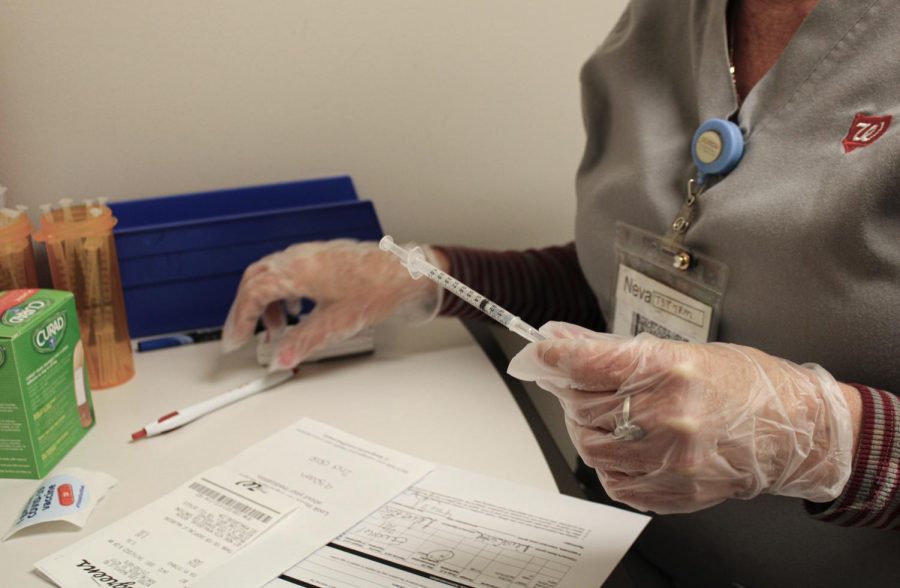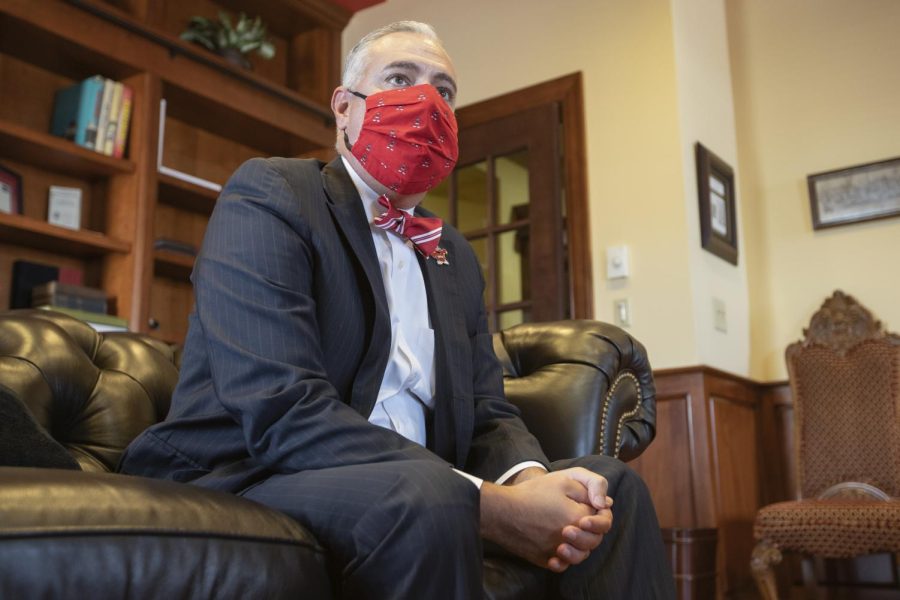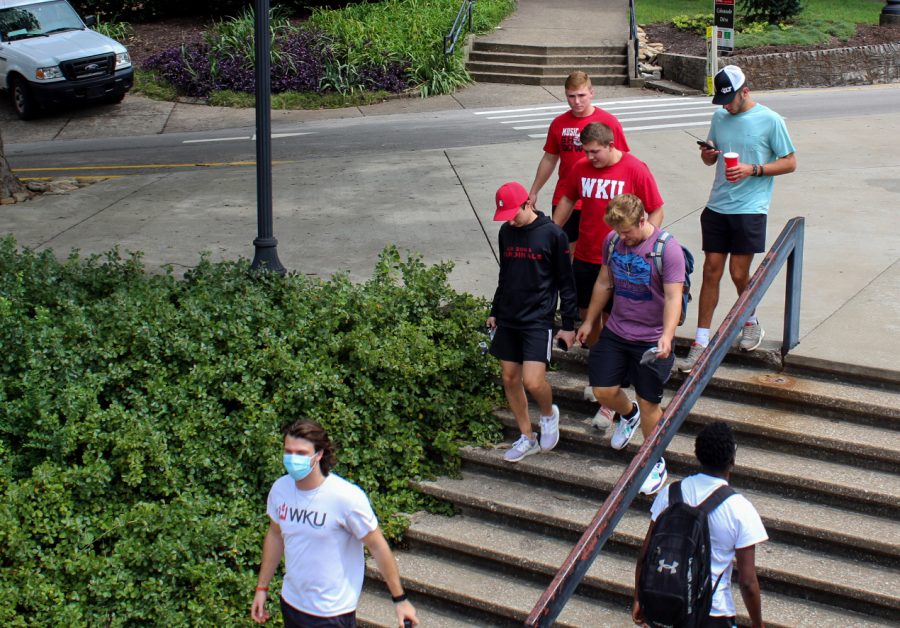This story was published in the May 8 final print issue. Read the full issue here.
Just over a century ago, WKU, which was then called Western Kentucky State Normal School, was going through a similar pandemic.
The 1918 flu pandemic completely altered campus for a period, causing the university to close for a month, David Lee, university historian and former provost, said. People wore masks and were prohibited from large gatherings, and an estimated two-thirds of students were infected.
Faced with a pandemic which hit the younger population, the university was unsure what the future would hold.
“In the depths of the pandemic in 1918, Henry Hardin Cherry said that he was confident that his school, that education would come through stronger and better than ever,” Lee said. “I don’t see any reason why that couldn’t be the case again.”
While WKU is making preparations for the next semester, it’s difficult to completely say what the future will hold. However, by looking at the past and how the campus has reacted since this pandemic began, higher education can begin to map a way forward.
WKU President Timothy Caboni has repeatedly said that though he plans on WKU students returning to the Hill in the fall, “this August won’t look anything like last August.”
Caboni said a possible way to maintain social distancing in a classroom setting would be hosting 300-person lecture classes in other, nonconventional locations, like Van Meter Hall or Diddle Arena.
“We have to think creatively about the spaces that we have available to us and how we create that social distance,” Caboni said.
Another solution could be staggered instruction, where students alternate days they attend class physically or online.
But another key part of campus life isn’t as easy to adapt for social distancing guidelines: shared living and dining spaces.
Caboni said everyone’s safety will be considered first. He envisions students wearing masks and perhaps giving at-risk faculty and students telework options.
“Until we have a vaccine or until you feel safe, but I’d be making the same choice for me,” Caboni said. “… I know we’re going to have to be intentional to take care of everyone who’s vulnerable.”
During this time, Caboni encouraged everyone to be “comfortable with uncertainty,” noting it is a hard thing to ask of people.
“I think what we have to do is not box ourselves in to make decisions earlier than they need to be made — to give us as much time to know as much as we can so that our decisions are in the best interest of everyone,” he said.
BUDGET
Due to the pandemic and the societal shift it’s created, Caboni predicts higher education does have some challenges ahead especially when it comes to finances and the economy.
Other state universities such as University of Kentucky and University of Louisville have announced budget cuts that include employee furloughs and layoffs. UK faces a $70 million deficit in the next year, while UofL is facing a $40 million deficit in the final three months of its fiscal year.
Already, Caboni said some smaller, private or liberal arts colleges which rely heavily on tuition have announced closings.
In the current fiscal year, Caboni has repeatedly said WKU’s budget is stable and tracking — however next year’s budget will present challenges and is still uncertain.
On April 22 Caboni announced the Executive Budget Council would develop a set of recommendations for the projected 2021 budget. These recommendations will be released to the public on Friday and later approved by the special-called Board of Regents meeting in June.
Without a current deficit, Caboni said WKU was at an advantage to manage future decline in revenue.
Ahead of the meeting, Caboni announced the university would see a 1% decrease in money from the state. The coronavirus pandemic would “significantly” affect the 2021 budget, Caboni wrote in an email.
When asked about the potential of a tuition increase due to the strained economic situation, Caboni said given the “enormous challenges” the community is facing, including increased unemployment filings, he’d “find it difficult to see a way to place any additional burdens on our students and their family.”
“My expectation is that as a community, we’ll engage in some shared sacrifice together so that we can all get through this together,” Caboni said.
At the April 17 Board of Regents committee meeting, Caboni announced he was taking a 10% salary reduction and would forego any bonuses and funnel it into the Opportunity Fund for WKU families.
Members of WKU Athletics including Director of Athletics Todd Stewart, men’s basketball coach Rick Stansbury and football coach Tyson Helton similarly took a 10% reduction.
While no one can fully predict when life will fully return to normal, Caboni said he is hopeful the state will reopen and begin to generate some of its lost revenue.
“But this is not going to be a light switch that we flick on,” Caboni said. “We may have to turn back a little bit if it feels like you’re spiking and then continue toward what will be a different way of working next August.”
LOOKING AT THE PAST TO DETERMINE OUR FUTURE
In navigating through this pandemic Caboni and Lee have examined how universities and higher education adapted after other historic challenges.
Most past challenges to higher education and WKU have related to growth, Lee said. These challenges meant institutions had to find ways to handle expansions and to create new opportunities.
“What we’re looking at now is something that challenges us in a different direction,” Lee said
For a while, Lee said higher education has been finding new ways to teach and learn, and he believes this pandemic may accelerate that experimentation and innovation. Beyond that, he said he hopes universities will find better ways to reach students who are not currently engaged by higher education.
Marko Dumančić, director for the Center for Innovative Teaching & Learning, said since the pandemic, CITL has transitioned about 2,500 course sections to an online format and over 700 faculty have attended webinars, adding up to thousands of hours.
In a recent virtual panel, faculty members were asked how this period may change their teaching in the future. Dumančić said many of the responses involved how technology has changed interaction with students not just in helping them learn but also providing advising sessions.
“I think faculty are even more open to the idea of technology facilitating contact inside and outside the classroom,” Dumančić said.
As higher education and teaching incorporate technology, Dumančić said the fundamentals will remain but faculty will just have more tools to fulfill those goals of teaching and connecting with students. In the past, he said faculty may have been too busy to experiment with the tools they are using now.
“Clearly nobody wanted for the situation to happen in the way that it did, particularly in the way that’s affected the personal lives of both faculty and students,” Dumančić said. “But what I’ve been impressed with is the resilience of faculty to find the right kinds of educational tools for their students.”
While Caboni has appeared optimistic about returning to campus, Dumančić said CITL is prepared for any outcome. Normally, CITL offers programs in online, in-person and hybrid classes. They are still prepared to do that and just need to adjust the emphasis.
“I think we’re positioned as a university better because we’ve done the work that’s necessary to make these things happen,” Dumančić said.
If the university does conduct classes online again, Dumančić said CITL will continue to have similar training they held in the past eight weeks but will include more depth and specifics. Through the end of this semester, he said the campus has seen what works for faculty and students, and they will focus on these tools more in the future.
CHANGES TO COME
As the university looks for ways to move forward, Caboni said he believes this experience has made the campus respect and appreciate in-person learning more.
“The vast majority of higher education professors [and] administrators love young people and the transformative experience that we work together to create with young people,” Caboni said. “Not having that in person experience I think makes us all value it that much more.”
Additionally, Caboni said WKU needs to remain focused on being a university of opportunity and accessibility. One way of doing this would be to stay focused on the scholarship program.
“No matter how difficult budgets might become, we have to say priority one is making sure that we remain accessible,” Caboni said.
Moving forward, Lee said he anticipates public health issues on campus becoming a priority to parents, students and recruitment. He cited past issues with mold in residence halls at WKU and across the country and now the pandemic.
“I think residential campuses are going to be thinking seriously and imaginatively about how you assure public health,” Lee said. “I think students and parents are going to have sharper questions for us about how we do that.”
Change is always difficult and sometimes painful. However, Lee said he is optimistic and confident in campus leadership, students, faculty and staff to make those changes.
“The pandemic is probably forcing us to learn something about ourselves — it’s probably forcing us to think in new ways, but that’s who we are, that’s what we do,” Lee said. “It’s a challenge that we can beat successfully.”
Editor-in-Chief Rebekah Alvey can be reached at rebekah.alvey660@topper.wku.edu. Follow her on Twitter at @bekah_alvey.
Managing Editor Laurel Deppen can be reached at laurel.deppen774@topper.wku.edu. Follow her on Twitter @laurel_deppen.














